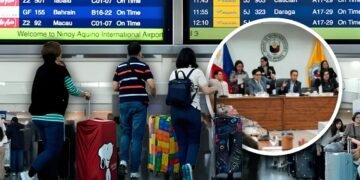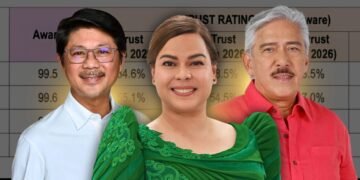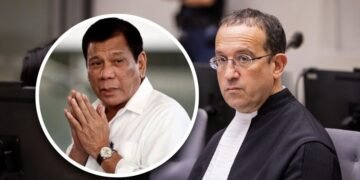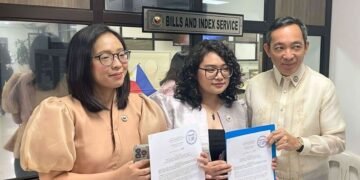Former President Rodrigo Roa Duterte’s constitutional rights were violated when local authorities arrested him on behalf of the International Criminal Court (ICC), according to the preliminary findings of the Senate Committee on Foreign Relations, chaired by Senator Imee Marcos.
The committee’s report also stated that the Philippines had no legal obligation to arrest or surrender Duterte to the ICC, noting that the country withdrew from the court in 2019 after it began investigating his administration’s drug war.
No Legal Obligation to Arrest Duterte for the ICC

The Senate Committee’s investigation first addressed whether the Philippines was legally obligated to arrest former President Duterte and surrender him to the International Criminal Court (ICC). It found significant procedural flaws in the ICC’s request.
Senator Imee Marcos noted that the International Criminal Police Organization (Interpol) had not issued a Red Notice to support the ICC’s warrant. Instead, authorities received a Diffusion Notice sent from the ICC’s email address.
This notice was neither verified by the Interpol Secretariat nor compliant with Article 3 of the Interpol Constitution, which prohibits actions based on political, military, religious, or racial grounds.
The notice stated: “Locate and arrest with a view to extradition: Assurances are given that extradition will be sought upon arrest of the person, in conformity with national laws and/or applicable bilateral and multilateral treaties.”
The committee described it as a “formal request for provisional arrest” issued under Article 92 of the Rome Statute.
However, it found that the notice did not satisfy the requirements under Article 91 for a formal “arrest and surrender,” as no follow-up request for extradition or surrender was ever made.
The committee also rejected Justice Secretary Jesus Crispin Remulla’s assertion that ICC jurisdiction remained valid under International Humanitarian Law (IHL).
It clarified that IHL applies only to war crimes, not to crimes against humanity—the charge Duterte faces.
Furthermore, the committee emphasized that procedural matters such as court processes are not part of customary international law, and that ICC jurisdiction requires explicit state consent, which the Philippines had withdrawn.
Government Collaboration with the ICC

Despite the absence of any legal obligation, the Senate Committee found that the Philippine government had actively coordinated with the International Criminal Court (ICC) to facilitate Duterte’s arrest—an effort that began well before the March 11, 2025, operation.
According to the committee’s findings, National Security Adviser Eduardo M. Año had been tracking Duterte’s movements in the days leading up to the arrest, while the Philippine National Police mobilized units as early as March 10.
Defense Secretary Gilberto Teodoro Jr. defended the Armed Forces of the Philippines’ involvement, stating they were deputized to support the PNP.
Executive Secretary Lucas Bersamin had also expressed readiness to cooperate with the ICC through Interpol.
In a statement dated November 13, 2024, he said: “But if the ICC refers the matter to the Philippine authorities, they may then transmit a red notice to the government [which] will feel obliged to consider the red notice as a request to be honored, in which case the domestic law enforcement agencies shall be bound to accord full cooperation to the Interpol pursuant to established protocols.”
Senator Marcos asserted that even prior to the arrest, the administration had a clear plan to assist the ICC.
The committee rejected Justice Secretary Jesus Crispin Remulla’s claim that the operation was merely a “group effort” based on rumors, calling the explanation “incredible” and an attempt to “cover up what was already aired on media,” according to the Senate Committee’s report.

Violations of Duterte’s Rights
Beyond the legal and procedural concerns, the Senate Committee identified multiple violations of former President Duterte’s constitutional rights during his arrest, pointing to serious breaches of due process.
The committee found that no warrant or court order was issued by any Philippine court, rendering the arrest unlawful and leaving no legal basis for Duterte’s extradition against his will.
Justice Secretary Jesus Crispin Remulla admitted that no effort was made to obtain such authorization.
Criminal Investigation and Detection Group Director Gen. Nicolas Torre III cited Article 125 of the Revised Penal Code to justify the immediate arrest for possible extradition to The Hague.
However, the committee noted that this provision applies only to specific warrantless arrests—which did not apply in Duterte’s case. It also found that Duterte was denied his constitutional right to liberty of abode.
Gen. Torre admitted to blocking Vice President Sara Z. Duterte from visiting her father at Villamor Air Base, in violation of Republic Act 7438.
Additionally, Duterte was prevented from being brought before judicial authorities and from seeking interim release or bail—rights protected under Article 59 of the Rome Statute and affirmed in Hong Kong SAR vs. Oalia (G.R. No. 153675, April 19, 2007).
The Department of Justice (DOJ) assumed the role of a “competent judicial authority” in issuing the arrest order. DOJ Spokesperson Jose Dominic Clavano defended the move as legally compliant, but the committee disagreed, citing Duterte’s limited access to legal remedies such as a Temporary Restraining Order (TRO).

While Remulla said Duterte was accompanied by three lawyers, the committee noted that this did not guarantee his legal rights were upheld, particularly since Duterte had designated Vice President Sara as his counsel—a request Gen. Torre refused, asserting his own authority.
Senator Imee Marcos has announced plans for a second Senate hearing to further examine the case, saying the committee needs strong, skilled, and knowledgeable witnesses to address unresolved questions surrounding the government’s actions and the Philippines’ cooperation with the ICC.
Following the initial hearing, Senator Marcos has formally withdrawn from the administration’s senatorial slate, Alyansa para sa Bagong Pilipinas, signaling a clear alliance with the Dutertes.
In a statement, she said her decision was prompted by actions taken by the Marcos administration in relation to the former president’s arrest.
“These run counter to my ideals and principles,” she said. “Thus, I cannot stand on the same campaign platform as the rest of the Alyansa.”
Marcos reaffirmed her independence, noting that she had made this position clear from the start of the election period.












